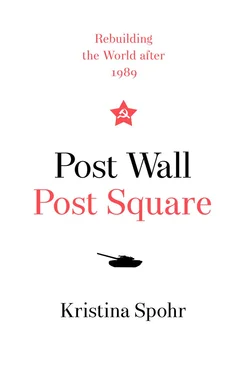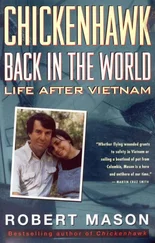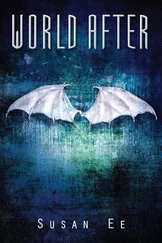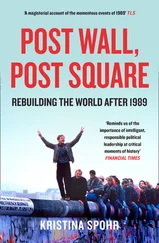He rang Thatcher first, at 10 p.m., because he thought that conversation would be ‘the most difficult’. [10]On the face of it, however, it went well. The prime minister, who had been watching events on television, said that the scenes in Berlin were ‘some of the most historic which she had ever seen’. She stressed the need to build a true democracy in East Germany and the two of them agreed to keep in close touch: Thatcher even suggested coming over for a half-day meeting before the upcoming European Council in Strasbourg early in December. Throughout the conversation, there was no mention of the word ‘unity’, but the chancellor clearly sensed that she felt ‘unease’ at the implications of the situation. [11]
He was able to extricate himself in less than half an hour, ready for what promised to be a more agreeable chat at 10.30 p.m. with George Bush. Kohl started with a survey of his trip to Warsaw and the economic predicament of Poland, but the president wasn’t interested. Cutting in, Bush said he wanted to hear all about the GDR. Kohl admitted the scale of the refugee problem and expressed scepticism about Krenz as a reformer. He also let off steam about those ‘leftist plebs’ who had tried to spoil his speech. But his assessment, overall, was very positive: the general mood in Berlin was ‘incredible’ and ‘optimistic’ – like ‘witnessing an enormous fair’ – and he told Bush that ‘without the US this day would not have been possible’. The chancellor could not stress enough: ‘This is a dramatic thing; an historic hour.’ At the end Bush was extremely enthusiastic: ‘Take care, good luck,’ he told Kohl. ‘I’m proud of the way you’re handling an extraordinarily difficult problem.’ But he also remarked ‘my meeting with Gorbachev in early December has become even more important’. Bush was right, the long-awaited tête-à-tête between him and the Soviet leader – only recently scheduled to take place in Malta on 2–3 December – could now not come soon enough. [12]
It was not possible to talk with Mitterrand that night. When they did speak at 9.15 the next morning Kohl took the same line but with an appropriately different spin. Not forgetting that 1989 was the bicentenary of the start of the French Revolution, the chancellor likened the mood on the Kurfürstendamm (West Berlin’s main shopping street) to the Champs-Elysées on Bastille Day. But, he added, the process in Germany was ‘not revolutionary but evolutionary’. Responding in similar vein, the French president hailed events in Berlin as ‘a great historical moment … the hour of the people’. And, he continued, ‘we now have the chance that this movement would flow into the development of Europe’. All very positive, of course, but perhaps also a reminder of traditional French concerns to see a strong Germany firmly anchored in the European integration project. Kohl had no problem with this and he was happy that both of them emphasised the strength of the Franco-German friendship. [13]
After talking to Mitterrand, Kohl took a call from Krenz – who had been pressing for a conversation. The two spoke for nine minutes – politely but insistently on both sides. Krenz was emphatic that ‘currently reunification was not on the political agenda’. Kohl said that their views were fundamentally different because his position was rooted in the FRG’s Basic Law of 1949, which affirmed the principle of German unity. But, he added, this was not the topic that should concern them both at the moment. Rather, he was interested in ‘getting to decent relations between ourselves’. He looked forward to coming to East Germany for an early personal meeting with the new leadership. Yet, he wanted to do so ‘outside East Berlin’ – the familiar FRG concern to avoid any hint of recognition of the GDR’s putative capital. [14]
The last of Kohl’s big calls – and the most sensitive of all – was with Gorbachev, before lunch on 11 November. Kohl set out some of the grave economic and social problems now facing the GDR, but stressed the positive mood in Berlin. Gorbachev was less testy than in his initial message to Kohl the previous day and expressed his confidence in the chancellor’s ‘political influence’. These were, he said, ‘historical changes in the direction of new relations and a new world’. But he emphasised the need above all for ‘stability’. Kohl firmly agreed and, according to Teltschik, ended the conversation looking visibly relieved. ‘ De Bärn is g’schält ’ (‘The pear has been peeled’) he told his aide in a thick Palatinate accent with a broad smile: it was clear that Gorbachev would not meddle in internal East German affairs, as the Kremlin had done in June 1953. [15]
Kohl could now feel reassured about his allies and the Russians, yet these were not his only worries. As he got off the phone he must have reflected on his own Deutschlandpolitik – its future direction and the responsibilities that now weighed heavily on him. All the more so, given what he had learned in Cabinet that morning about just how unstable the situation really was.
So far that year, according to the Interior Ministry, 243,000 East Germans had arrived in West Germany, as well as 300,000 ethnic Germans ( Aussiedler ) who could claim FRG citizenship: in other words, well over half a million immigrants in ten months. And this was before the fall of the Wall. The economic costs were also escalating. According to the Finance Ministry, DM 500 million had to be added to the budget in 1990 just to provide emergency shelters for the recent influx of GDR refugees. And an additional DM 10 billion a year for the next ten years might be required to build permanent housing and provide social benefits and unemployment payments. Moreover, the FRG was already subsidising the GDR economy to the tune of several billion a year. And far more would clearly be needed if the GDR were to be propped up sufficiently to stem the haemorrhage of people. But for how long could it be sustained? And what would happen if Germany unified? Revolution was certainly turning the East upside down, but life for West Germans was evidently changing as well – and not all those changes were welcome. [16]
Even if, in the short term, such spending on the GDR and on the migrants was economically feasible, any talk of raising taxes to cover the costs was politically impossible for Kohl and his coalition partners in an election year. The recent rise in the FRG of the Republikaner (the radical right’s new party) reflected growing resentment at the immigrant crisis and dismay at the financial burden to be carried by West German citizens. [17]
Although Kohl had talked about ‘stability’ to Gorbachev and to his Western allies, as he flew back to Warsaw on the afternoon of 11 November to pick up the threads of his Polish visit, he must have seen how difficult it would be to keep the GDR functioning. But, of course, he had no real desire to do so in the longer run. The ‘stability’ he was now beginning to contemplate was how to facilitate a peaceful and consensual transition to a unified German state – a project that had been inconceivable just two days before. [18]
*
How had this Rubicon been reached, only five weeks after the grand celebrations to mark the fortieth anniversary of the East German state?
In reality the big party on 7 October was a facade, to paper over the huge and growing cracks in the communist state. As soon as Gorbachev left East Berlin for Moscow, demonstrations erupted across the city and elsewhere in the GDR and the authorities now cracked down hard. The 7th was the day of what had become a monthly protest against the May election fraud. Nevertheless, while those who had fled the country amounted to tens of thousands, the number of dissidents and those openly antagonistic to the regime was still relatively small, especially outside the big cities of Dresden, Leipzig and East Berlin. Protests and demonstrations were quite contained, involving no more than several hundred people. Formal opposition groups had only just been created since the opening of the Austro-Hungarian border: by the beginning of October some 10,000 people belonged to Neues Forum as well as Demokratie Jetzt, Demokratischer Aufbruch, SDP (SozialDemokratische Partei in der DDR) and Vereinigte Linke. These smaller groupings were mostly associated with Neues Forum. Millions of GDR citizens remained passive and hundreds of thousands were still willing to defend the state. [19]
Читать дальше












